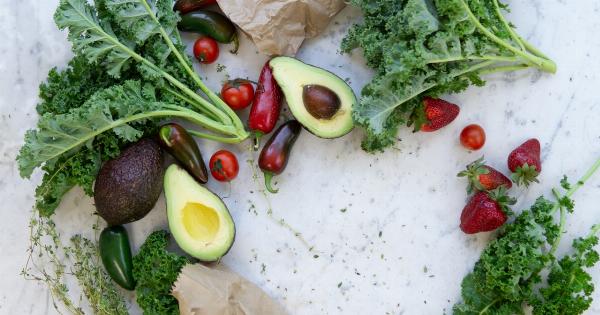Cancer is a prevalent and life-threatening condition that affects millions of people around the world.
While there is no guaranteed way to prevent cancer, research suggests that certain dietary and lifestyle factors can help reduce the risk of developing this disease. One such factor is the regular consumption of nuts.
The Role of Nuts in Cancer Prevention
Nuts are nutrient-dense foods that pack a powerful punch when it comes to cancer prevention. They are rich in a variety of compounds such as antioxidants, polyphenols, and phytosterols that have been shown to have anticancer properties.
Additionally, nuts are excellent sources of fiber, healthy fats, vitamins, minerals, and other bioactive substances that contribute to overall health and well-being.
1. Almonds
Almonds are a popular type of nut that offer numerous health benefits, including cancer prevention. Research has found that almonds contain high levels of antioxidants such as vitamin E, which can help neutralize harmful free radicals in the body.
Free radicals are unstable molecules that can cause DNA damage, leading to the development of cancer. Almonds also contain fiber, vitamin B17, and fatty acids that may help reduce the risk of various types of cancer, including breast and colon cancer.
2. Walnuts
Walnuts are another excellent choice for reducing the risk of cancer. These nuts are particularly rich in omega-3 fatty acids, which have been associated with a reduced risk of certain cancers, including breast and prostate cancer.
They also contain phytosterols, antioxidants, and polyphenols that can help combat cancer cells. Regular consumption of walnuts has been linked to improved cognitive function, heart health, and a lower risk of cancer.
3. Brazil Nuts
Brazil nuts are known for their high selenium content. Selenium is a mineral that plays a crucial role in antioxidant function, DNA repair, and immune system health.
Studies have suggested that selenium-rich foods like Brazil nuts may help reduce the risk of certain types of cancer, including colorectal, lung, prostate, and breast cancer. However, it’s important to consume Brazil nuts in moderation due to their high selenium concentration.
4. Cashews
Cashews not only add a delightful crunch to your dishes but also offer potential cancer-fighting properties. They are rich in vitamins, minerals, fiber, and plant compounds that can help protect against certain types of cancer.
Cashews are particularly high in a type of flavanol called proanthocyanidins, which have been shown to inhibit the growth of cancer cells in test-tube studies. Including cashews as part of a balanced diet may contribute to a decreased risk of cancer.
5. Pecans
Pecans are packed with various compounds that may help reduce the risk of cancer. They are an excellent source of antioxidants, including vitamin E, vitamin A, and ellagic acid.
These antioxidants work together to neutralize free radicals and prevent cellular damage that could lead to cancer development. Pecans also contain plant sterols like beta-sitosterol, which have been shown to inhibit the growth of cancer cells in laboratory studies.
6. Pistachios
Pistachios are not only a delicious snack but also a valuable addition to a cancer-preventive diet. They are a great source of vitamin E, which acts as a potent antioxidant in the body.
Pistachios also contain a unique combination of antioxidants, including lutein and zeaxanthin, which have been associated with a reduced risk of various types of cancer, such as lung and breast cancer. Adding pistachios as a part of your daily nut intake can contribute to an overall lower cancer risk.
7. Hazelnuts
Hazelnuts are packed with beneficial nutrients that make them an excellent choice for cancer prevention. They are rich in vitamin E, fiber, healthy fats, and bioactive compounds like phytosterols and flavonoids.
These compounds have demonstrated potential anticancer effects in various studies. Hazelnuts have also been associated with a reduced risk of colorectal cancer and may help protect against other types of cancer as well.
8. Macadamia Nuts
Macadamia nuts are native to Australia and are becoming increasingly popular due to their creamy texture and delicious taste. These nuts are a great source of monounsaturated fats, vitamin B1, magnesium, and manganese.
Although research specifically linking macadamia nuts to cancer prevention is limited, their nutrient profile and antioxidant content suggest a potential role in reducing cancer risk. Including macadamia nuts as part of a varied and balanced diet can contribute to overall wellness and help reduce the risk of cancer.
9. Pine Nuts
Pine nuts, also known as pinoli, are the edible seeds of pine trees. They have been used in culinary traditions for centuries and offer an abundance of health benefits. Pine nuts are a good source of healthy fats, iron, and zinc.
They also contain antioxidants, including vitamin E and polyphenols, which have been shown to have anti-inflammatory and anticancer effects. Incorporating pine nuts into your diet can be a flavorful way to enhance your meals while contributing to cancer prevention.
10. Peanuts
Although commonly referred to as nuts, peanuts are actually legumes. Nevertheless, they still offer potential benefits in reducing the risk of cancer.
Peanuts are rich in resveratrol, a polyphenol that has been associated with a decreased risk of several cancers, including breast, colorectal, and prostate cancer. They are also a good source of monounsaturated fats and contain various other bioactive compounds that contribute to overall health. Including peanuts in your diet can provide cancer-protective effects.
Conclusion
Nuts are not only a delicious and versatile addition to your diet but can also play a significant role in reducing the risk of cancer.
The unique combination of vitamins, minerals, healthy fats, fiber, and bioactive compounds found in nuts contribute to their potential cancer-fighting properties. Incorporating a variety of nuts into your daily diet can provide numerous health benefits and help in the prevention of various types of cancer.





























